When Science Meets the Force
May the Fourth be with you! To prepare for Star Wars Day, we explore how stories from a galaxy far, far away have inspired science in Singapore and interview James Emmann Lim, one of Science Centre Singapore’s (Jedi) Master Science Educators.
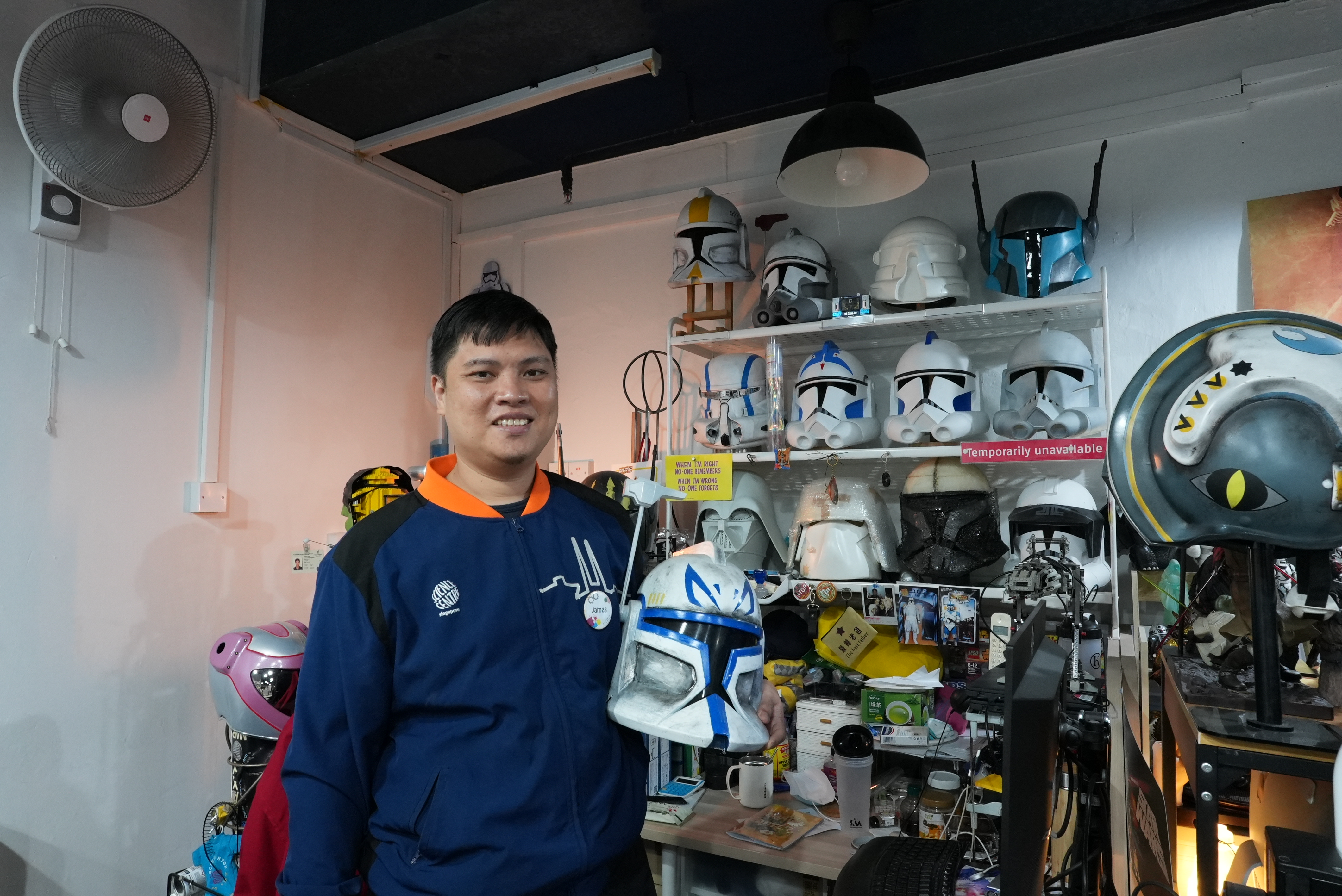
Master Science Educator James Emmann Lim with his Star Wars themed desk.
From massive sea bugs to groundbreaking artificial skin, Star Wars has left its mark on science. Earlier this year, when an ASEAN team of researchers including Prof. Peter Ng from the Lee Kong Chian Natural History Museum discovered a new giant isopod species in the South China Sea, its helmet-like head earned it the name Bathynomus vaderi after Darth Vader, arguably cinema's most iconic villain.
This "supergiant Darth Vader sea bug" is one of the most recent scientific discoveries referencing the beloved space opera series. Other examples of the growing list of species connecting pop culture with scientific research include Wockia chewbacca moth (a fuzzy Mexican moth named after Chewbacca) and the elegant Begonia amidalae (a speckled begonia in Borneo named after Queen Padmé Amidala). But the science fiction franchise's influence extends far beyond scientific names.
In laboratories in Singapore and beyond, childhood dreams of Star Wars technology are becoming reality. In 2020, Singaporean technologist Benjamin C. K. Tee, inspired by Luke Skywalker's sophisticated bionic hand, developed an electronic skin that recreates the sense of touch. Like many scientists committed to pushing the final frontier, the Associate Professor’s team at NUS Department of Materials Science and Engineering works to transform what was once science fiction into tangible innovation.
While Star Wars may seem more fantasy than hardcore science fiction, its fusion of mythological storytelling and futuristic technology has spurred real-world scientific advancement—from holograms to artificial intelligence. At Science Centre Singapore, the interplay between science fiction and science fact creates powerful opportunities for STEM learning.
A Force for Science Education
Star Wars’s impact on public engagement with science in Singapore began with the release of the first Star Wars film here in 1978. A year later, Science Centre Singapore organised a science fiction short story writing competition to encourage science fiction as a gateway to science. The Centre later hosted The Art of Star Wars exhibition from November 2005 to April 2006, setting the stage for future science fiction initiatives.
In 2024, Science Centre Singapore held the inaugural Sci-Fi Fiesta from 1-5 May. The Centre also hosted Star Wars Day celebrations in collaboration with local fan group #MayThe4thSG during the 4-5 May weekend. At Sci-Fi Fiesta stations, visitors built space vehicles, played with light reflection to create invisibility shields, and examined alien-looking organisms under microscopes.
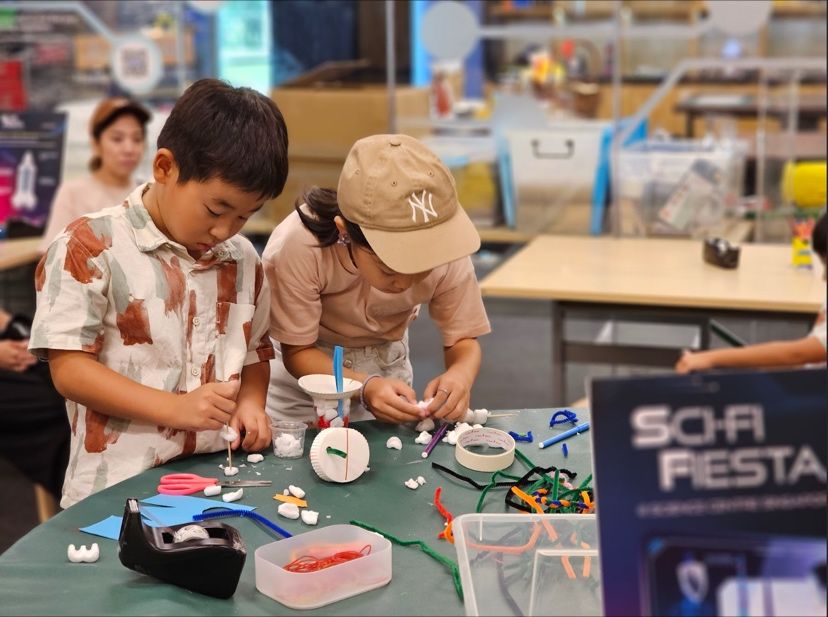
Kids crafting rocket ships at Tinkering Studio during Sci-Fi Fiesta. Photo credits: Science Centre Singapore.
At booths manned by Star Wars fan groups, visitors built their very own lightsabers using household materials, joined bounty hunts looking for droids, and exercised their artistic skills in toy photography workshops.
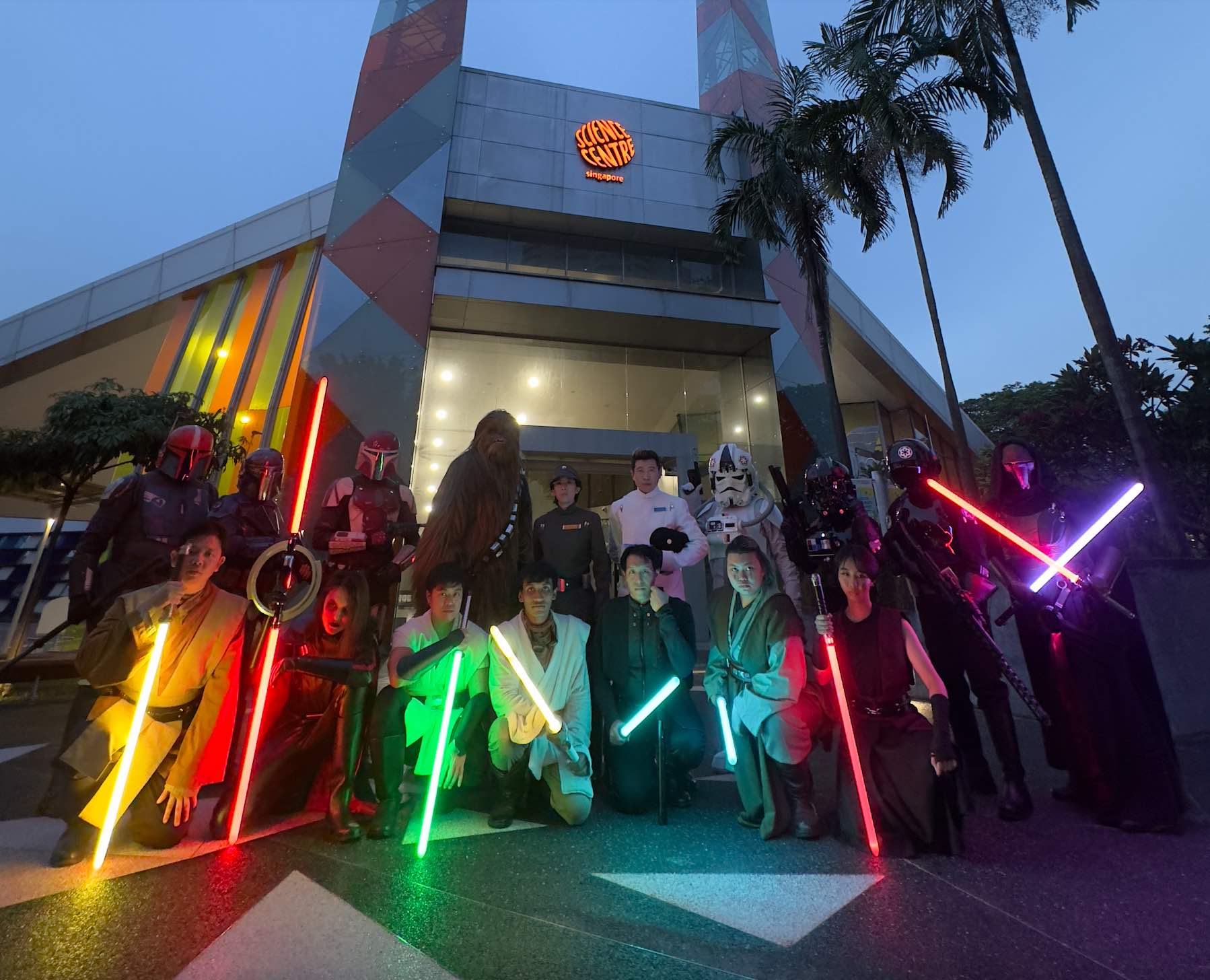
May the Fourth 2024 celebrations at Science Centre Singapore. Photo credits: #MAYTHE4THSG.
At Science Centre Singapore, Star Wars serves as more than entertainment—it's a powerful force for public engagement with science. When organising Sci-Fi Fiesta and the Star Wars Day weekend, James Emmann Lim, a Master Science Educator at the Centre, harnessed the franchise's appeal to make technical concepts accessible.
"Science fiction is a draw for discussions and scientific discovery," James explains. He mentions how famous science communicators like Neil deGrasse Tyson have used Star Wars to unpack scientific principles from hypothetical interstellar travel to the reality of sound in space.
While the films take creative liberties—like the unrealistically dense asteroid belts the Millennium Falcon manoeuvres , or the improbably loud pew-pew blaster gun noises—these scenes spark valuable conversations about the real-world physics of space.
James gives the example of the Kaminoan clone army in Star Wars as fiction that can get audiences curious to find out more about genetic engineering, cloning, and biotechnology.
Sharp-eyed visitors might notice Star Wars-related references around the Centre, from a Darth Vader figurine in Edison Lab, the Centre’s multimedia classroom, to familiar Star Wars tunes sung by the Tesla coil during the Energy Titans Show. These 'easter eggs' serve as fun ways to get people excited about STEM.
Thank the Maker
Step into the Gallery Experience office at Science Centre Singapore and you’ll immediately notice two desks displaying an impressive shrine of Star Wars collectibles. James, together with Alfred Lim, another Master Science Educator at the Centre, are widely known amongst staff as diehard Star Wars fans. The duo have even dressed up as a Scout Trooper and Chewbacca for staff Dinner and Dance events.
Standing at 183 cm—the exact height of clone troopers—James found his niche in the local Star Wars fan community building screen-accurate costumes from scratch. Building the props "was the hook for me, being an engineer [since] I like to tinker," James said.
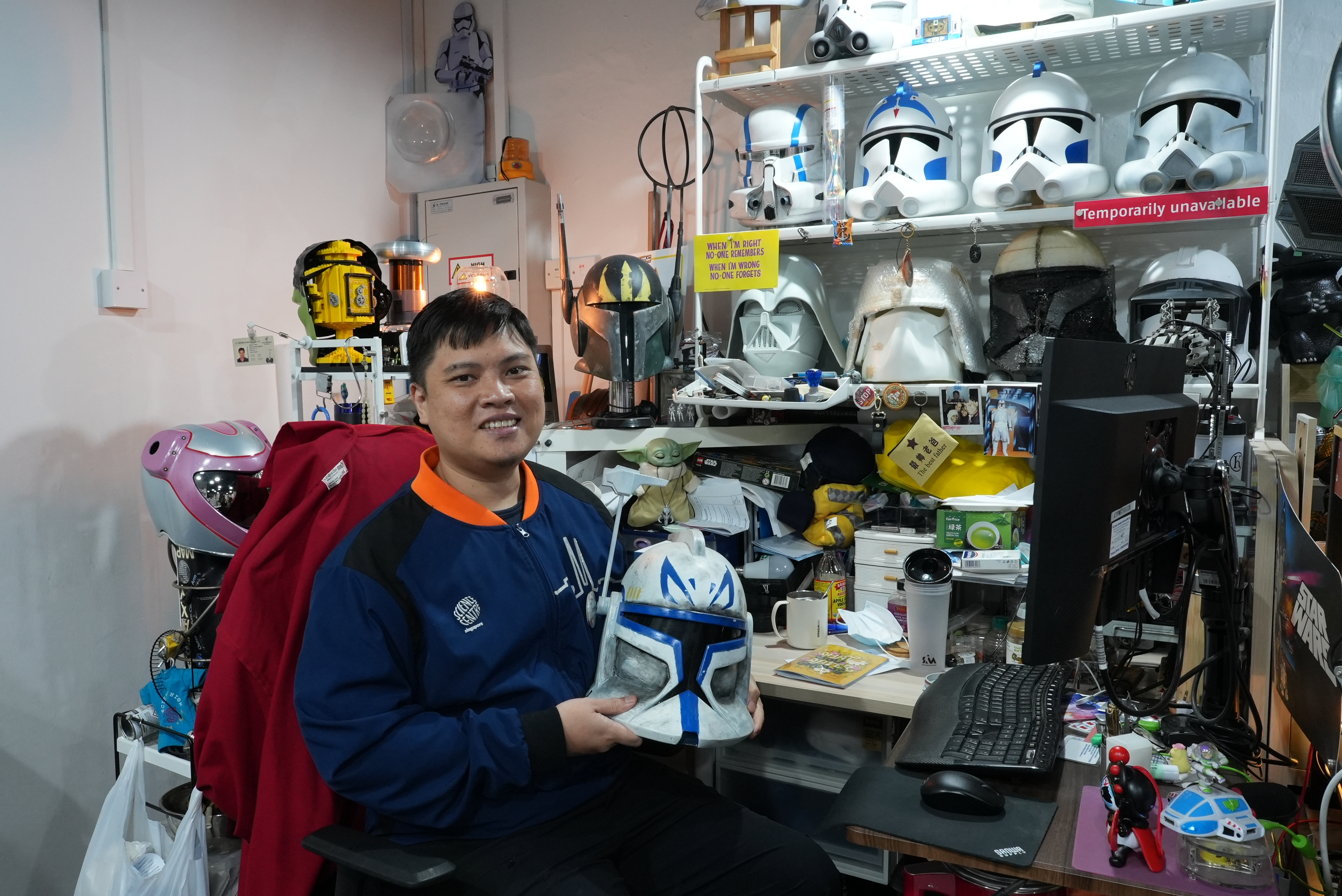
James Emmann Lim showcasing a Captain Rex helmet at his desk.
As a former industrial engineer, James was excited to apply his manufacturing knowledge to Star Wars fandom. "All the things [of propmaking] were familiar, like my armour or vacuum foam ... how to deal with fillers, Bondo material, how to glue, how to snap things, paint, cut… these are all engineering things," James observes.
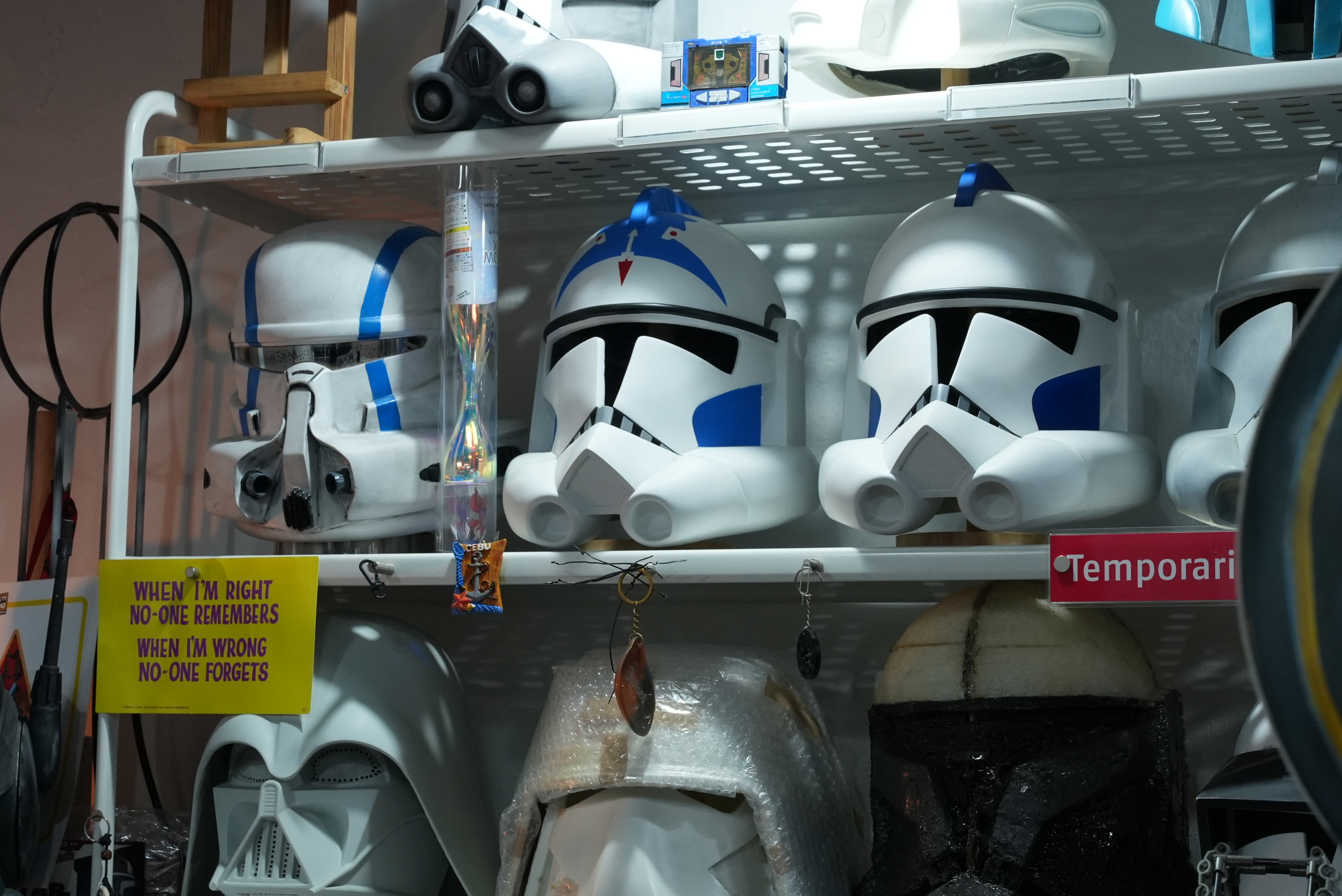
Clone trooper helmets at James Emmann Lim's desk.
He even moulds or machines intricate little bits called "greeblies" or "greebles" to make props look more utilitarian and complex, like real armour straight out of science-fiction.
James and Alfred are both members of the 501st Legion Singapore Garrison, part of a worldwide Star Wars costuming organisation recognized as Lucasfilm's preferred Imperial stormtrooper costuming organisation. Outside work, they regularly participate in charity events, using their passion for Star Wars for community service.
"It's a win-win... I get to do what I love [and] help charity donations," James said.
Even beyond the Centre, James shares his engineering expertise with novice Star Wars costume makers, creating a community of learners passionate about making stuff from science fiction come to life.
Those familiar with Star Wars lore will remember that the protagonists are often makers, such as Anakin Skywalker assembling and programming C-3PO. The franchise is full of inspiration for budding engineers.
Training the Next Generation
On a broader level, the master-apprentice relationship central to Star Wars resonates with James’s teaching approach. As a Master Science Educator, James trains junior staff in visitor engagement and science communication.
In Star Wars, “there's always a master and apprentice," he reflects. "It’s up to you to discover what the master has discovered, and maybe even surpass the master."
To James, from an educator’s perspective, the Star Wars series stresses the importance of seeing learning as an ongoing journey and passing down knowledge to the younger generation.
He points out that "the sci-fi a few years ago, maybe fifty years ago, sixty years ago, is already reality."
"Star Trek, our phones, the Internet, AI, robotics, all of these were science fiction ... now they're all reality and part of everyday life." James sees the genre as a thought-provoking and imaginative way to get the public to dream and "push scientific achievement."
Join the Dark Side at Science Café
Want to unwind at the end of the work week and nerd out about science-fiction over wine and canapes? Hear from an actual rocket scientist and a science poet and mingle with other like-minded science enthusiasts at Science Centre Singapore’s upcoming Science Café session, "Sci-Fi or Sci-Fact?" on Friday 30 May from 6:30pm-8:15pm at Book Bar, 57 Duxton Road, Singapore 089521.
Science Café is a monthly informal dinner series for adults 18 and above where speakers share their takes on interdisciplinary STEM topics, from AI and art to South Polar dinosaurs and forensic science. Join us to enjoy a new kind of geeky nightlife! Tickets available here.
Written by Jamie Uy
Photography by Ai Xin Qin
Published 2 May 2025

